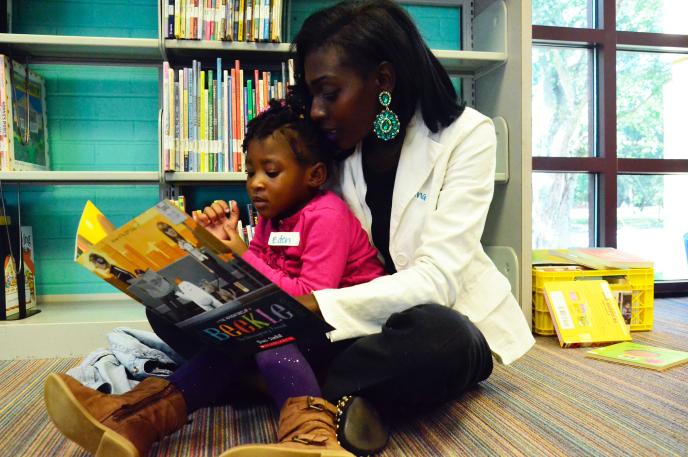
Join the Library for an I Can read Black stories storytime program for Día
April 15, 2021
This blog was written as part of Charlotte Mecklenburg Library's Black Lives Matter program initiative. Learn more about the program and corresponding events here.
In June 2020, Charlotte Mecklenburg Library made a statement that “systemic racism and inequity have no place in our Library as we stand up for equity, access, inclusion, diversity and democracy.” Library staff has been working to find ways to support our community by creating opportunities to learn and dialogue with one another through Library programs and resources.
As part of the Library's commitment to Black Lives Matter programming, a new Storytime series, "i can Read Black Stories" launched on Saturday, January 2, 2021. The target audience for the weekly program is families with children between the ages 0-5. During Storytime diverse Library staff members read picture books that feature characters who are Black, African American or people of color. The stories, songs, and movement activities will support empathy and understanding of issues affecting the Black community and offer strategies to foster conversations on equity and inclusivity.
Some books like The Other Side by Jacqueline Woodson or Ruth and the Green Book by Alexander Ramsey Calvin have historical overtones, while others like Baby Goes to Market by Atinuke and Sonya’s Family by Elliot Riley feature “everyday diversity.” Books to affirm and empower, like I Am Every Good Thing by Derrick Barnes and I Am Enough by Grace Byers are also shared often.
Why read Black stories? Educator Rudine Sims Bishop, professor emerita at The Ohio State University, devoted her career to multicultural literacy. In her seminal work, Mirrors, Window, and Sliding Glass Doors she writes, “When children cannot find themselves reflected in the books they read, or when the images they see are distorted, negative, or laughable, they learn a powerful lesson about how they are devalued in the society of which they are a part.”
Of the 3,717 children’s books published in the United States in 2019, only 1,094 of them were about Black, Indigenous and/or Persons of Color (BIPOC). Data on books by and about Black, Indigenous and People of Color published for children and teens is compiled by the Cooperative Children’s Book Center, School of Education, University of Wisconsin-Madison. The Cooperative Children’s Book Center determines that a book is about characters of a specific ethnicity or racial identity if the main character is BIPOC or if a BIPOC character or real person is featured significantly in the book, even if the main character is white. If the main character is white and there are secondary characters of color who do not play a key role in the story, then a book is not considered to be about BIPOC.
Charlotte Mecklenburg Library celebrates Día during April. Día is a nationally recognized initiative that emphasizes the importance of literacy for all children from all backgrounds. It is a daily commitment to linking children and their families to diverse books, languages, and cultures. On Saturday, April 24 at 11 a.m., join the Children’s Services department for a special Día-themed I Can Read Black Stories program. The program which will be live streamed via the Facebook Page for ImaginOn: The Joe & Joan Martin Center. It will celebrate Afro-Hispanic and Afro-Latino authors and illustrators and Afro-Hispanic and Afro-Latino characters. To watch live Storytime programs visit the ImaginOn's Facebook page: https://www.facebook.com/ImaginOn/ and choose “LIVE” on the left-hand navigation list. There will be a red dot next to the word “LIVE” to indicate that Storytime is in session.
Learn more about the program here
Programs like Día and i can Read Black Stories help children to embrace diversity by accepting differences in others. Teaching children to accept differences when they are young helps them to have responsible, caring and positive social interactions when they are older. We hope that you will join us for these programs as we further our mission to improve lives and build a stronger community.
--
This blog was written by Alesha Lackey, children’s services manager at Allegra Westbrooks Regional Library.
